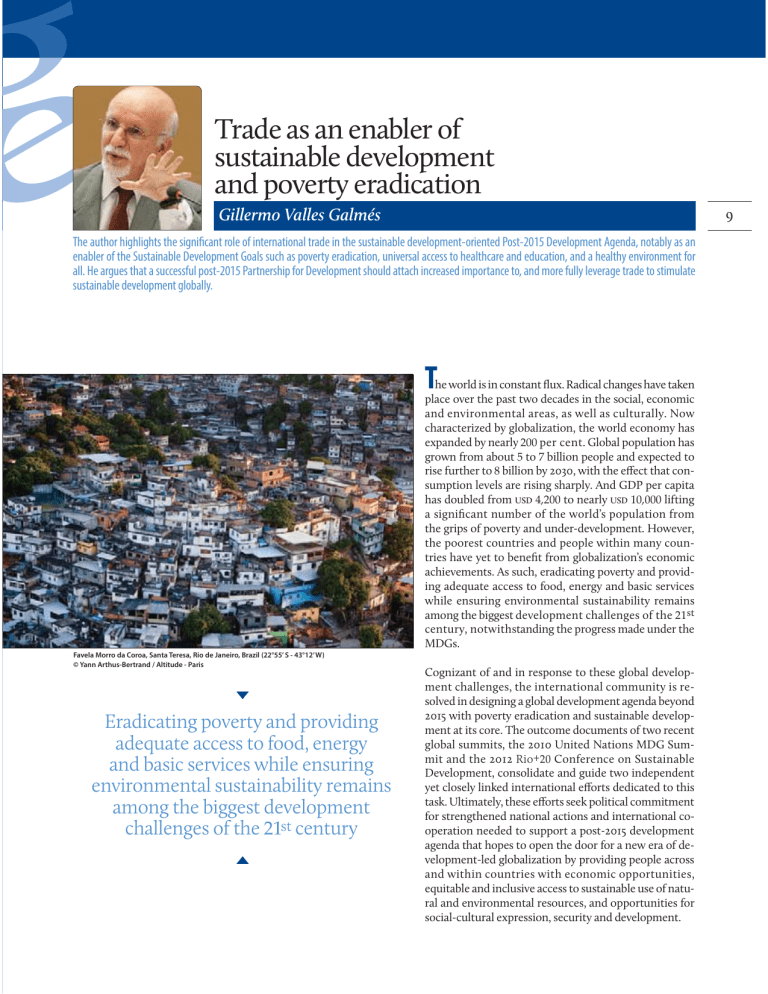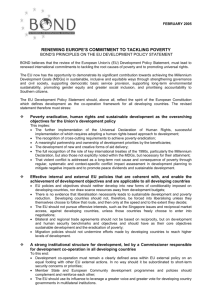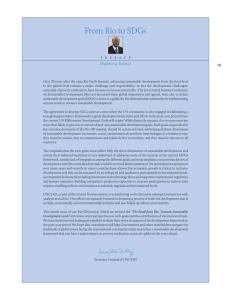Trade as an enabler of sustainable development and poverty eradication

Trade as an enabler of sustainable development and poverty eradication
Gillermo Valles Galmés
The author highlights the significant role of international trade in the sustainable development-oriented Post-2015 Development Agenda, notably as an enabler of the Sustainable Development Goals such as poverty eradication, universal access to healthcare and education, and a healthy environment for all. He argues that a successful post-2015 Partnership for Development should attach increased importance to, and more fully leverage trade to stimulate sustainable development globally.
Favela Morro da Coroa, Santa Teresa, Rio de Janeiro, Brazil (22°55’ S - 43°12’ W)
© Yann Arthus-Bertrand / Altitude - Paris
Eradicating poverty and providing adequate access to food, energy and basic services while ensuring environmental sustainability remains among the biggest development challenges of the
21 st
century
T he world is in constant flux. Radical changes have taken place over the past two decades in the social, economic and environmental areas, as well as culturally. Now characterized by globalization, the world economy has expanded by nearly 200 per cent. Global population has grown from about 5 to 7 billion people and expected to rise further to 8 billion by 2030, with the effect that consumption levels are rising sharply. And GDP per capita has doubled from USD
4,200 to nearly USD
10,000 lifting a significant number of the world’s population from the grips of poverty and under-development. However, the poorest countries and people within many countries have yet to benefit from globalization’s economic achievements. As such, eradicating poverty and providing adequate access to food, energy and basic services while ensuring environmental sustainability remains among the biggest development challenges of the 21 st century, notwithstanding the progress made under the
MDGs.
Cognizant of and in response to these global development challenges, the international community is resolved in designing a global development agenda beyond
2015 with poverty eradication and sustainable development at its core. The outcome documents of two recent global summits, the 2010 United Nations MDG Summit and the 2012 Rio+ 20 Conference on Sustainable
Development, consolidate and guide two independent yet closely linked international efforts dedicated to this task. Ultimately, these efforts seek political commitment for strengthened national actions and international cooperation needed to support a post-2015 development agenda that hopes to open the door for a new era of development-led globalization by providing people across and within countries with economic opportunities, equitable and inclusive access to sustainable use of natural and environmental resources, and opportunities for social-cultural expression, security and development.
The United Nations Post-2015 Development Agenda must seek to deepen and extend efforts pursuant to the
2000 Millennium Summit and the Millennium Development Goals (MDGs), while the Sustainable Development Goals (SDGs) called for in the Rio+ 20 Conference must advance principles for sustainable development adopted at the 1992 Rio Earth Summit and promulgated through Agenda 21 . Today, there is broad agreement that both of these efforts should ultimately converge in one
Post-2015 Development Agenda centered on the global achievement of sustainable development and eradication of poverty. There is also broad acknowledgement that both processes also must take cognizance and respond to changing economic, social and environmental conditions since 2000.
The goals need to be limited in number. If an SDG is created for every global issue, certainly such a number would be difficult to manage, monitor, communicate, finance and achieve. And in practical terms, a large number of SDGs would also make it difficult to integrate relevant issues – artificially characterized into separate and independent goals – into an integrated holistic development process.
Other related issues may be best integrated into the development framework as targets for closely related goals rather than independent goals. For example, countries’ performance in effecting greenhouse gas reduction, arresting deforestation, promoting sustainable agricultural practices, and reducing over-fishing and effluent pollution in oceans can all be effective targets used to measure countries’ respective progress in supporting the goal of providing their citizens with a healthy environment for current and future generations.
As regards international trade, after over two decades of experience with globalization, it is widely recognized today that international trade can be a powerful engine of sustainable development and poverty alleviation. Participating in international trade can widen the economic space needed to create new job opportunities, promote efficient use of resources, increase access to food, energy and basic services, and improve productive, managerial and entrepreneurial capacity required for economic diversification, growth and development.
The first step towards a consolidation of many possible sustainable development goals involves recognizing that dynamic and resilient economies, transparent societies and a healthy environment underpin a central objective of poverty eradication and sustain inclusive social and economic progress. Thus, many issues in the goals are really not sustainable development goals in themselves, but rather enablers, or drivers, of sustainable development. For example, equitable international trade can enable countries to achieve food security, generate decent employment opportunities for the poor, promote technology transfer, ensure national economic security and support infrastructure development, not only for moving goods to and from ports, but also for basic services such as health, education, water, sanitation and energy. As such equitable trade may be more effectively harnessed in delivering sustainable development when integrated into the SDG framework as an SDG enabler. In such framework, trade would serve as an enabler for potential goals such as poverty eradication, job creation, universal healthcare and education, and a healthy environment.
However, it must be acknowledged that trade can have negative, as well as positive, impacts on economic, environmental, and social systems. Countries have found that economic activities supporting rapidly expanded trade can result in serious environmental degradation when complementary environmental policies are not in place. Pollution of air, water, and soil, and unrestrained natural resource exploitation causing desertification, deforestation, sea level rise and fisheries depletion may grow to levels that jeopardize sustainable development efforts. Unmanaged, trade liberalization can also have negative social impacts including brain-drain and cultural erosion. However, prompted by warnings loudly voiced in the 1992 Rio Earth Summit, countries have made substantial progress in the past two decades to assess the impacts of trade and trade liberalization allowing them to conduct trade in a way that captures its benefits, while minimizing its negative impacts.
A universal, rules-based, open, nondiscriminatory and equitable multilateral trading system, as well as meaningful trade liberalization, with accompanying flanking measures, remains critical if the global economy is to reach out and connect those still marginalized from
International trade...
should be integrated into the future development framework in accordance with the appropriate goals, targets and indicators as a key enabler of poverty eradication and sustainable development
global markets. And the multilateral trading system itself must evolve. Areas where change can help support sustainable development include strengthened disciplines on agriculture, fisheries and fossil fuel subsidies; agreement on forms of non-actionable government support to national sustainable production and consumption; reduced environmental and other non-tariff barriers to trade including voluntary sustainability standards; broader terms for the transfer of environmental technologies to, and broadened use of related intellectual property rights by, developing countries. green goods and services through mechanisms such as biotrade and renewable energy. Policy space to be able to use appropriate policies to build sustainable and resilient economies is a key factor.
Moreover, given the increasing importance of global value chains in world production models, more attention needs also to be focused on helping developing countries to connect with global production and supply chains, including by meeting environmental requirements, and facilitating the participation of low-income producers or exporters in the production and trade of environmentally and socially preferable products. This would contribute to enhancing industrialization as well.
Improved international cooperation should also build developing countries’ human and productive capacities to enable them to participate in an environmentally sustainable global economy; generate employment for the jobless and increase access of the poor to basic services such as energy, water, communications and transport.
At the national level, improving pro-poor outcomes of trade depends on the ability of countries to implement complementary national measures to facilitate their participation in the trade of sustainably produced goods and services, and promote the inclusive and equitable diffusion of its benefits. A clear area is through production of
Through an integrated portfolio of analyses on policy options, capacity building technical assistance projects and intergovernmental consensus building activities,
UNCTAD works in close partnership with developing countries and other international organizations, the private sector and NGOs to foster a transition to more sustainable (and less polluting) production, trade and development processes. UNCTAD’s current work focuses on opening new production and trade opportunities, and removing barriers especially non-tariff measures, in green products, including biotrade, renewable energy, organic agriculture products, and creative industries that assist in particular rural communities in developing countries to sustainably diversify production, tap new markets, generate jobs including for women, youth and ex-combatants, and mitigate climate change.
International trade has a fundamental role to play as an enabler for engendering inclusive economic growth and sustainable development, and in turn contribute to eradicating poverty. Thus trade should be integrated into the future development framework in accordance with the appropriate goals, targets and indicators as a key enabler of poverty eradication and sustainable development
End Notes
1 IPCC, 2007, IPCC Fourth Assessment Report: Climate Change 2007.
2 OECD, 2012, OECD Environmental Outlook to 2050.
3 UNDP, 2011, Human Development Report.
About the author
Guillermo Valles Galmés (Uruguay) is currently Director of UNCTAD's Division of International Trade in Goods and Services, and Commodities. He has served as Ambassador to the United Nations and the World Trade Organization (WTO) in Geneva, where he was lead negotiator for several regional trade agreements and Chair for Rules negotiations for six consecutive years. A career diplomat for some
35 years, he has served as Ambassador to China, the European Union, Belgium and Luxemburg as well as in different posts in Japan and Argentina.






